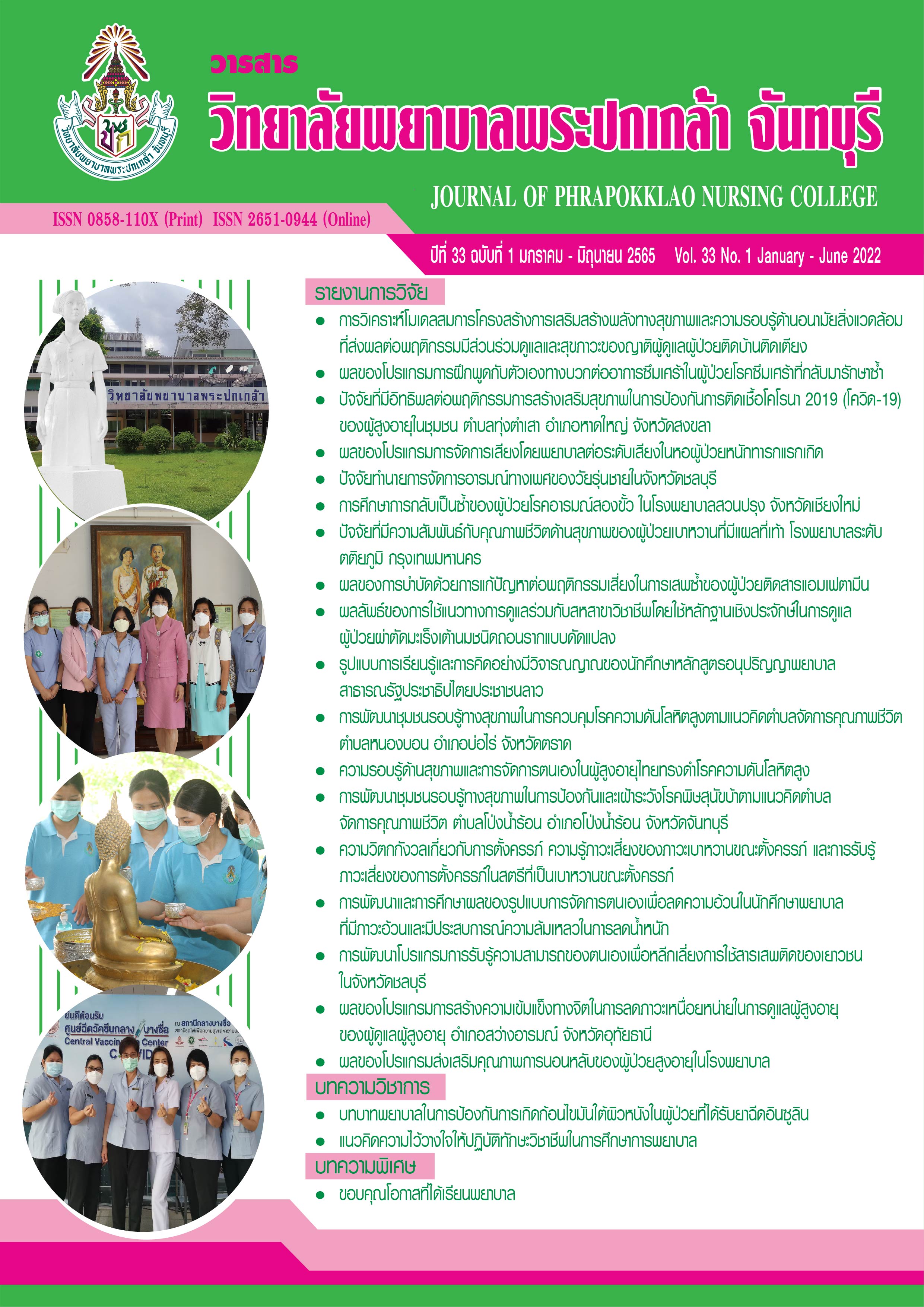The Development and the Study of Effect of Self-management Model to Reduce Obesity in Obese Nursing Students with Failed Weight-loss Experience
Keywords:
Self-management model, Obesity, Weight loss, Failed weight-loss experienceAbstract
This research and development aimed to develop and study the effect of self-management model to reduce obesity in obese nursing students with failed weight-loss experience. The samples were second- and third-year obese nursing students with failed weight-loss experience of Phrapokklao Nursing College, Chanthaburi. The research was divided into five phases: Phase 1 assessed obesity and weight loss experience with a sample of 25 people. Phase 2 developed a self-management model to reduce obesity in obese nursing students with failed weight-loss experience. Phase 3 tested a feasibility of using self-management model to reduce obesity with an experimental group of 13 people. Phase 4 improved and tried-out the self-management model to reduce obesity, and phase 5 evaluated the use of the self-management model to reduce obesity with an experimental group of ten people and a control group of 12 people. The research instruments consisted of the self-management model to reduce obesity in obese nursing students with failed weight-loss experience, the self-management manual for weight loss, the obesity assessment form, weight scale, tape measure, caliper, and the semi-structured interview form. The implementation and data collection were conducted from March, 2019 to February, 2020. Data were analyzed using thematic analysis, Mann-Whitney U Test, Wilcoxon signed-rank test, and Fisher’s exact test.
The research results revealed that 1) the self-management model to reduce obesity in obese nursing students with failed weight-loss experience had been developed. The main components of this model are the management of diet, exercise, activities of daily living, sleep, and stress; 2) after the experiment, the experimental group had statistically significantly lower mean of weight, body mass index, waist circumference, and fat percentage than those of before the experiment (p < .01); and 3) the experimental group was statistically significantly able to achieve a greater amount of weight loss in terms of weight and fat percentage than those of the control group (p < .05).
This research suggests that healthcare personnel and education administrators should adopt this self-management model in college students who are obese and experience weight loss failures by focusing on self-discipline, having behavioral adjustment strategies, and self-monitoring of obesity in order to promote effective and maintain weight loss.
References
กระทรวงสาธารณสุข. (2559). แผนยุทธศาสตร์ชาติระยะ 20 ปี (ด้านสาธารณสุข). สืบค้นจาก http://www.oic.go.th/FILEWEB/CABINFOCENTER2/DRAWER023/GENERAL/
เกรียงศักดิ์ สมบัติ สุรนาถวัชวงศ์, ไพบูลย์ พงษ์แสงพันธ์, และกาญจนา พิบูลย์. (2563). ประสิทธิผลของโปรแกรมสนับสนุนการจัดการตนเองต่อภาวะอ้วนของบุคลากรคณะแพทยศาสตร์ มหาวิทยาลัยบูรพา. บูรพาเวชสาร, 7(2), 23–38.
ชดช้อย วัฒนะ. (2558). การสนับสนุนการจัดการตนเอง: กลยุทธ์ในการส่งเสริมการควบคุมโรค. วารสารวิทยาลัยพยาบาลพระปกเกล้า จันทบุรี, 26(เพิ่มเติม 1), 117–127.
ชลวิภา สุลักขณานุรักษ์, และอูน ตะสิงห์. (2564). ปัจจัยที่มีผลต่อความสำเร็จในการลดน้ำหนักของผู้ที่มีภาวะอ้วน. วารสารวิชาการสาธารณสุข, 30(4), 614–622.
ชาย โพธิสิตา. (2564). ศาสตร์และศิลป์การวิจัยเชิงคุณภาพ (พิมพ์ครั้งที่ 9). กรุงเทพฯ: สำนักพิมพ์แห่งจุฬาลงกรณ์มหาวิทยาลัย.
นพรัตน์ มีจินดา, ชมพูนุท สิริพรหมภัทร, และกิรณา แต้อารักษ์. (2563). ปัจจัยที่มีความสัมพันธ์กับดัชนีมวลกายของนักศึกษาวิทยาลัยการสาธารณสุขสิรินธร จังหวัดขอนแก่น. วารสารวิทยาศาสตร์สุขภาพและการสาธารณสุขชุมชน, 3(1), 83–94.
ปราณี จันธิมา, และสมเกียรติ ศรีธาราธิคุณ. (2560). ผลของการสนับสนุนการจัดการตนเองต่อการปรับเปลี่ยนพฤติกรรมสุขภาพในกลุ่มเสี่ยงโรคอ้วนลงพุง. พยาบาลสาร, 44(2), 162–171.
ยุภา โพผา, สุวิมล แสนเวียงจันทร์, มณฑา ลิ้มทองกุล, ศิปภา ภุมมารักษ์, กัลยภรณ์ เชยโพธิ์, และสุจิตรา หัดรัดชัย. (2565). อุปสรรคและแรงจูงใจในการปรับเปลี่ยนพฤติกรรมสุขภาพของผู้ที่อ้วนลงพุง. วารสารการแพทย์โรงพยาบาลอุดรธานี, 30(1), 24–34.
วรุณีย์ สีม่วงงาม, และอนุชา เพียรชนะ. (2558). ผลของโปรแกรมลดน้ำหนักโดยประยุกต์ใช้ทฤษฎีการรับรู้สมรรถนะแห่งตน ทฤษฎีขั้นตอนการเปลี่ยนแปลงพฤติกรรม ร่วมกับทฤษฎีแรงสนับสนุนทางสังคมของนักศึกษาพยาบาลที่มีภาวะน้ำหนักเกินมาตรฐาน มหาวิทยาลัยราชธานี. วารสารราชพฤกษ์, 13(2), 115–123.
วิชัย เอกพลากร, หทัยชนก พรรคเจริญ, และวราภรณ์ เสถียรนพเก้า. (2564). การสำรวจสุขภาพประชาชนไทยโดยการตรวจร่างกาย ครั้งที่ 6 พ.ศ. 2562–2563. สืบค้นจาก https://www.hsri.or.th/researcher/research/new-release/detail/13461
สุภาพร ทิพย์กระโทก, และธนิดา ผาติเสนะ. (2563). ผลของโปรแกรมการจัดการตนเอง เพื่อปรับเปลี่ยนพฤติกรรมสุขภาพ ค่าดัชนีมวลกาย และเส้นรอบเอว ของอาสาสมัครสาธารณสุขประจำหมู่บ้านที่มีภาวะอ้วนลงพุง. วารสารศูนย์อนามัยที่ 9, 14(34), 210–223.
อรพินท์ สีขาว, อภิรมย์ฤดี สมสวย, ศิริญญา ธนะขว้าง, ปรางค์ทอง คุณเที่ยง, นันทัชพร ต๊อดแก้ว, ฐิตาภา บุญมีประเสริฐ, … ณิชาภัทร บุรีเลิศ. (2561). พฤติกรรมการสร้างเสริมสุขภาพของนักศึกษาพยาบาลที่มีดัชนีมวลกายเกินมาตรฐาน มหาวิทยาลัยหัวเฉียวเฉลิมพระเกียรติ. วารสาร มฉก.วิชาการ, 22(43–44), 1–12.
อรรถพงษ์ ชุ่มเขียว, กาญจนา ทองบุญนาค, อุบล ชื่นสำราญ, และณัฐิยา ตันตรานนท์. (2562). ประสิทธิผลของโปรแกรมควบคุมน้ำหนักที่เน้นเรื่องการปรับเปลี่ยนพฤติกรรมการรับประทานอาหารในนักศึกษาที่มีน้ำหนักเกินหรือเป็นโรคอ้วน. พยาบาลสาร, 46(3), 106–117.
อรวรรณ ประภาศิลป์, ชดช้อย วัฒนะ, และทิพาพร ธาระวานิช. (2556). ผลของโปรแกรมการส่งเสริมสมรรถนะในการจัดการตนเองต่อพฤติกรรมการจัดการตนเอง ภาวะอ้วน ความเสี่ยงต่อการเกิดโรคหัวใจและหลอดเลือด และการหายจากภาวะเมตาบอลิกซินโดรมในผู้ที่มีภาวะเมตาบอลิกซินโดรม. พยาบาลสาร, 40(1), 34–48.
Akinyemiju, T., Moore, J. X., Pisu, M., Judd, S. E., Goodman, M., Shikany, J. M., … Gilchrist, S. C. (2018). A prospective study of obesity, metabolic health, and cancer mortality. Obesity, 26(1), 193–201. doi:10.1002/oby.22067
Creer, L. T. (2000). Self-management of chronic illness. In M. Boekaerts, P. R. Printrich, & M. Zeidner, (Eds.). Handbook of self-regulation (pp. 601–629). San Diego, CA: Academic Press.
Hall, K. D., & Kahan, S. (2018). Maintenance of lost weight and long-term management of obesity. The Medical Clinics of North America, 102(1), 183–197. doi:10.1016/j.mcna.2017.08.012
Hoare, E., Millar, L., Fuller-Tyszkiewicz, M., Skouteris, H., Nichols, M., Malakellis, M., … Allender, S. (2016). Depressive symptomatology, weight status and obesogenic risk among Australian adolescents: A prospective cohort study. BMJ Open, 6(3), e010072.
Krupa-Kotara, K., & Dakowska, D. (2021). Impact of obesity on risk of cancer. Central European Journal of Public Health, 29(1), 38–44. doi:10.21101/cejph.a5913
Lopez-Sandoval, J., Sanchez-Enriquez, S., Rivera-Leon, E. A., Bastidas-Ramirez, B. E., Garcia-Garcia, M. R., & Gonzalez-Hita, M. E. (2018). Cardiovascular risk factors in adolescents: Role of insulin resistance and obesity. Acta Endocrinologica, 14(3), 330–337. doi:10.4183/aeb.2018.330
Peterson, N. D., Middleton, K. R., Nackers, L. M., Medina, K. E., Milsom, V. A., & Perri, M. G. (2014). Dietary self-monitoring and long-term success with weight management. Obesity (Silver Spring, Md.), 22(9), 1962–1967. doi:10.1002/oby.20807
van Vuuren, C. L., Wachter, G. G., Veenstra, R., Rijnhart, J. J. M., van der Wal, M. F., Chinapaw, M. J. M., & Busch, V. (2019). Associations between overweight and mental health problems among adolescents, and the mediating role of victimization. BMC Public Health, 19(1), 612. doi:10.1186/s12889-019-6832-z
Varkevisser, R. D. M., van Stralen, M. M., Kroeze, W., Ket, J. C. F., & Steenhuis, I. H. M. (2019). Determinants of weight loss maintenance: A systematic review. Obesity Reviews, 20(2), 171–211. doi:10.1111/obr.12772
World Obesity Federation. (2022). World obesity atlas 2022. Retrieved from https://www.worldobesityday.org/assets/downloads/World_Obesity_Atlas_2022_WEB.pdf
Downloads
Published
How to Cite
Issue
Section
License
Copyright (c) 2022 JOURNAL OF PHRAPOKKLAO NURSING COLLEGE

This work is licensed under a Creative Commons Attribution-NonCommercial-NoDerivatives 4.0 International License.
เนื้อความ ข้อมูล และรายการอ้างอิงที่ผู้เขียนใช้ในการเขียนบทความเพื่อลงตีพิมพ์ในวารสารวิทยาลัยพยาบาลพระปกเกล้า จันทบุรี ถือเป็นความคิดเห็นและความรับผิดชอบของผู้เขียน คณะผู้จัดทำวารสารไม่จำเป็นต้องเห็นพ้องด้วยหรือร่วมรับผิดชอบ
บทความที่ได้รับการลงตีพิมพ์ในวารสารวิทยาลัยพยาบาลพระปกเกล้า จันทบุรี ถือเป็นลิขสิทธิ์ของวารสารวิทยาลัยพยาบาลพระปกเกล้า จันทบุรี หากหน่วยงานหรือบุคคลใดต้องการนำส่วนหนึ่งหรือทั้งหมดของบทความไปเผยแพร่ต่อเพื่อวัตถุประสงค์ใด ๆ จะต้องได้รับอนุญาตจากบรรณาธิการวารสารก่อน



